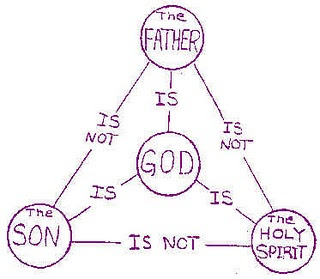The Trinity - three into one goes just fine
Vic the Vicar reveals his hidden depths today with a post on the Trinity. Don't let his jokey tone fool you - this is actually a thoughtful and theologically rigorous reflection on doctrine and modern Christian preaching. Best of all is this diagram that he provides:

The problem we have is that explanations like this are hard for the quasi-scientific mindset which governs the way most people think in our culture. We have, by and large, bought into the idea that we can discover how things work by taking them to pieces and looking at the constituent parts. This reductionism is quite un-Christian. God is not a machine that can be disassembled, nor even a creature that can be dissected so we can see all His parts. He is Mystery.
Christians are often reductionists too, and find it hard to accept mystery. This is what leads to bizarre sermon illustrations of the kind that Vic describes, which only serve to give false impressions of what God is like and then confuse people even more. God isn't an ice cube, a candle, or a spiritual Clark Kent/Superman duo, he is Father, Son and Holy Spirit.

As he says, not a bad summary of the teaching of the early Fathers.
The problem we have is that explanations like this are hard for the quasi-scientific mindset which governs the way most people think in our culture. We have, by and large, bought into the idea that we can discover how things work by taking them to pieces and looking at the constituent parts. This reductionism is quite un-Christian. God is not a machine that can be disassembled, nor even a creature that can be dissected so we can see all His parts. He is Mystery.
Christians are often reductionists too, and find it hard to accept mystery. This is what leads to bizarre sermon illustrations of the kind that Vic describes, which only serve to give false impressions of what God is like and then confuse people even more. God isn't an ice cube, a candle, or a spiritual Clark Kent/Superman duo, he is Father, Son and Holy Spirit.
The best explanation I know of the Trinity is that this is the way we experience God. We know the care of a generous Creator (Father), the grace of a loving Saviour (Son), and the power and presence of a constant Guide (Spirit). Thus the Trinity is a way of expressing the reality that we experience, rather than an abstract philosophical debate. We "get it" when we open our minds to the full reality of who God is, rather than trying to reduce him to little symbols.
Comments
The Trinity has always been a major hurdle for me and to date the best explanation I have seen is David Cloake's version "Dad Junior and The Spook", i think it was called.
I shall now add yours and Vic's to my collection which hopefully, will enable me to see "Through a glass less darkly".
"At this point I need to anticipate an objection. It will be said that a philosopher is trespassing on the territory of the theologian: the doctrine of the Trinity is a mystery, beyond the capacities of human reason, and hence the tools of logic are irrelevant to it. The objection is based on a misunderstanding. The doctrine of the Trinity is indeed supposed to be a mystery. That simply means, however, that assurance of its truth cannot be provided by human reason but only by divine revelation. It is to be believed "not because of the natural light of reason, but because of the authority of God who reveals it."" But a mystery is not supposed to be refutable by human reason, as if a truth of reason could somehow contradict a revealed truth; on the contrary, putative refutations are supposed themselves to be refutable. Nor is a mystery supposed to be unintelligible, in the sense that the words in which it is expressed simply cannot be understood. After all, we are asked to believe the propositions expressed by the words, not simply that the words express some true propositions or other, we know not which."
On the 'quasi scientific mindset' bit: it's not a problem of science, narrowly understood, but logic. If a=b and b=c then a=c, where the = sign is understood as signifying numerical identity.
The best explanation I have seen is Peter Geach's: there are three persons but one God. God the father is a different person from God the Son, but they are the same God.
His aim (in his words) "is to be a theologian who makes the hard stuff simple and the simple (he writes sime which i think must be simple) everyday. I seek to make stuff accessible and teach some deep stuff whilst doing it, hence the blog style (which is who I am and how and what I think / believe)."
Thank you for pointing to him - I will be adding you both to my watching list